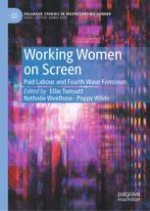2024 | OriginalPaper | Buchkapitel
4. “Millennial Dumplings” at Work: Women’s Emotional and Aesthetic Navigation of Creative Workplaces in US Comedy Drama Series Shrill and Mythic Quest
verfasst von : Ellie Tomsett
Erschienen in: Working Women on Screen
Aktivieren Sie unsere intelligente Suche, um passende Fachinhalte oder Patente zu finden.
Wählen Sie Textabschnitte aus um mit Künstlicher Intelligenz passenden Patente zu finden. powered by
Markieren Sie Textabschnitte, um KI-gestützt weitere passende Inhalte zu finden. powered by
